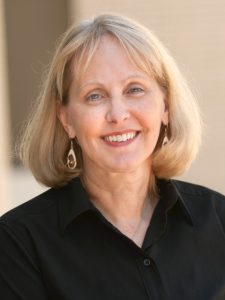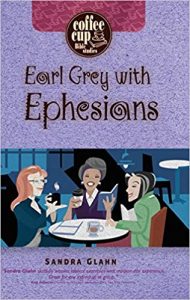Sandra Glahn on coffee cup devotions
 Dr. Sandra Glahn is interim chair and associate professor of Media Arts and Worship at Dallas Theological Seminary. She is the author or coauthor of more than twenty-five books, including eleven titles in the Coffee Cup Bible Study series and the Christy Award finalist Lethal Harvest.
Dr. Sandra Glahn is interim chair and associate professor of Media Arts and Worship at Dallas Theological Seminary. She is the author or coauthor of more than twenty-five books, including eleven titles in the Coffee Cup Bible Study series and the Christy Award finalist Lethal Harvest.
Tell us about your newest book.
Earl Grey with Ephesians is the newest title in the Coffee Cup Bible Study series. Each book in the series includes the text of the biblical book or section to be studied; interesting background info; art, history, and music connections; and a focus on the women in the book’s original audience who would have heard it read. Coffee Cup studies can be used alone for personal devotions or as part of group discussion—which is why some, including Earl Grey with Ephesians,come with a leaders’ guide.
What genre do you focus on and why?
I love writing both fiction and non-fiction, but for the past few years I have focused on non-fiction, with a special emphasis in biblical studies. Women increasingly want studies that take into account a variety of learning styles (not everyone does well with a lecture format), and they’re also interested in women of the Bible and Bible times.
Why do you write? What drives you?
I love to write. And I’ve found when it comes to biblical content that writing helps me clarify what I believe. Someone once asked Madeleine L’Engle (A Wrinkle in Time) if her faith influences her writing, and she said it’s the other way around—her writing influences her faith. The same is true for me. If my prose lacks clarity, it’s usually because I myself have some fuzziness in my thinking, so I have to go back to the text and ask the Spirit to guide me as I dig more deeply.
What does a day in your writing world look like?
I try to start the day with Bible study—rather than only a devotional. I work to get a steady diet of the straight-up text, not a commentary about the text.
I’m a professor in a theological seminary, so part of my job is training the next generation of writers (I may be one of the few people on earth who will admit to loving Millennials). Often I teach class in the afternoon or evening. And since I’m filling in for my boss, who is on sabbatical this year, I attend a lot of morning meetings. Mornings are my best writing hours, so this year I’m having to get out of my comfort zone and write in the evenings. I also guard my one day off from doing any work—Saturday evening to Sunday evening, usually. That space for down time in my life is key to both my sanity and my creativity. Evenings I can be found binge-watching Madam Secretary.
What is the hardest part of being an author? Why?
It’s easy to let the writing get pushed to the margins as email takes over my in-box. And I need to run a family member to a doctor appointment. Or visit an aging parent. Or get to the gym. Or answer “will you read this for me and give me feedback, please?” from a stranger. (Even if I say no, I have to reply.) I work best with large segments of time, but I rarely have the luxury of large blocks.
What’s the best part of your author’s life? Why?
I love the flexible hours and spaces of writing. If I wake up at 3 am with an idea, I can write. If I’m sitting in a coffee shop in Italy, I can do my work. I can write in my jammies. I can work from a hospital bed. I can do work I love virtually anywhere in the world that has electricity and internet access—once in a boat in the Galapagos Islands, where my father-in-law wanted to take a bucket-list trip. I could write when I stayed home with a young child, and God willing, I can still write when I’m old and frail.
What is the craziest thing you’ve experienced as an author?
My craziest experience as an author was spending the night in a Bedouin tent in Jordan as part of a press junket for the Jordan Ministry of Tourism. That experience helped me understand how Laban could pass off Leah as her sister and how Jael could wield a peg without being caught. Even the next day in the middle of sun-baked desert daylight, I could not see my hand in front of my face standing in that black-wool woven tent. I also realized a snake could have spent the night in that tent with me, and I’d never know.
What are you most proud of?
I’m most proud of the writers I’ve mentored. They write about God’s heart for immigrants, sex-abuse recovery, and spiritual-abuse recovery, book reviews, faith-filled parenting, and women of the Bible we’ve wrongly vilified like Bathsheba and Vashti and Rahab. The list goes on. I love to write my own stuff, but watching former students help shape the lives of those I could never reach brings such joy!
What is your favorite pastime?
I love reading classic works, from Dostoevsky to Dickens, Cowper to Cather. So many stories, so little time. I also love some newer authors such as Chimamanda Ngozi Adichie and Marilynne Robinson who masterfully weave in faith themes without using religion gratuitously.
Do you have other books? We’d love to know.
Yes! I mentioned Lethal Harvest (Kregel).I also wrote a couple of books on infertility and pregnancy loss (When Empty Arms Become a Heavy Burden [Kregel]; The Infertility Companion[Zondervan]) and one for married couples—Sexual Intimacy in Marriage (Kregel), due out soon in its fourth edition. My most recent novel was Informed Consent (Cook). And I especially love my non-fiction compilation, Vindicating the Vixens: Revisiting Sexualized, Vilified, and Marginalized Women of the Bible (Kregel Academic). Profits on the latter benefit the International Justice Mission. The book was released last year in the height of #MeToo and #ChurchToo, even though we’ve been working on it for ten years. It was thrilling to see God use the work of sixteen scholars to help readers revisit the stories of a select group of women whose old, old stories we needed to see through fresh eyes.
What are you working on now?
I co-teach a seminary course on sexual ethics that looks at gender issues (e.g., male/female norms and stereotypes, LGBT issues, trans-sexuality), porn, and all sorts of other challenges related to life in the body that ministry leaders need to better understand. I’m working as a general editor on that compilation, with each chapter written by someone whose expertise lies in the subject of the chapter. So I’m more curator than writer—though some writers do need more help with prose than others.
Website: www.aspire2.com
Social media links:
Twitter: @SandraGlahn
FB: https://www.facebook.com/aspire2/
Follow me on social media!
